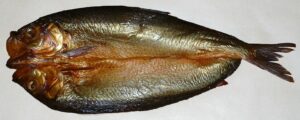
Anyway, in the episode I watched last night, it was lent so they were cooking with fish, such as smoked red herrings (kippers) and salted cod, and it was mentioned that during Elizabeth I’s reign the traditional Catholic Friday fish eating tradition had been extended so that fish was also eaten on Wednesdays and Saturdays. Why? Well, it certainly wasn’t for nutritional reasons and it wasn’t for religious reasons either, it was to support the fishing trade and to enable Elizabeth I to have a large navy who were in constant training at sea and to keep them busy. In a time where England was living under constant threat, it was important to have a large naval force who were highly skilled and ready to defend the country. One of the main achievements of Elizabeth’s reign was successfully defending England from the threat of invasion by building on what her father, Henry VIII, had started – the Navy.
Cecil’s Fast
Cecil’s Fast – Definition: A dinner of fish. W. Cecil (Lord Burleigh) introduced a Bill to enjoin the eating of fish on certain days in order to restore the fish trade. (Brewer’s Dictionary)
The idea of having “fish days” to support the fish trade, and therefore the English Navy, seems to have been the brainwave of William Cecil, 1st Baron Burghley and Elizabeth I’s chief advisor. He could see that the Reformation had harmed the fishing trade, as people started eating meat on Fridays (a day which had been traditionally associated with fish eating as people remembered Good Friday) and being less observant of the usual traditions of Lent. This harmed both the fishing trade and the Navy, as they were inextricably linked, and men who had once been fishermen and sailors were forced into committing acts of piracy or looking for different work. James Anthony Froude, in “English Seamen in the Sixteenth Century”, writes:-
“In harbour there were still a score of large ships, but they were dismantled and rotting; of artillery fit for sea work there was none. The men were not to be had, and, as Sir William Cecil said, to fit out ships without men was to set armour on stakes on the seashore. The mariners of England were otherwise engaged and in a way that did not please Cecil. He was the ablest Minister that Elizabeth had. He saw at once that on the Navy the prosperity and even the liberty of England must eventually depend. If England were to remain Protestant, it was not by Articles of religion or Acts of Uniformity that she could be saved, without a fleet at the back of them. But he was old-fashioned. He believed in law and order, and he has left a curious paper of reflections on the situation. The ships’companies in Henry VIII.’s days were recruited from the fishing smacks, but the Reformation itself had destroyed the fishing trade. In old times, Cecil said, no flesh was eaten on fish days. The King himself could not have license. Now to eat beef or mutton on fish days was the test of a true believer. . . . The fishermen had taken to privateering because the fasts of the Church were neglected. He saw it was so. He recorded his own opinion that piracy, as he called it, was detestable, and could not last. He was to find that it could last, that it was to form the special discipline of the generation whose business it would be to fight the Spaniards. But he struggled hard against the unwelcome conclusion. He tried to revive lawful trade by a Navigation Act. He tried to restore the fisheries by Act of Parliament. He introduced a Bill recommending godly abstinence as a means to virtue, making the eating of meat on Fridays and Saturdays a misdemeanour, and adding Wednesday as a half fish day. The House of Commons laughed at him as bringing back Popish mummeries. To please the Protestants he inserted a clause that the statute was politically meant for the increase of fishermen and mariners, not for any superstition inthe choice of meats; but it was no use. The Act was called in mockery “Cecil’s Fast,” and the recovery of the fisheries had to wait till the natural inclination of human stomachs for fresh whiting and salt cod should revive in itself.”
In 1563, William Cecil forced Parliament, after much arguing, to pass an act making it unlawful for anyone to eat meat during Lent. The punishment would be either 3 months in jail or a fine of 3 pounds. In a handwritten codicil, Cecil attempted to calm those of a more Puritan persuasion, who hated the Catholic traditions, by explaining that this act was for economic reasons only. A bill also made Wednesday, Friday and Saturday “fish days”, with Cecil explaining:-
“Let the old course of fishing be maintained by the straitest observations of fish days for policy’s sake; so the sea coasts should be strong with men and habitations and the fleet flourish more than ever.”

But what fish was eaten and how on earth did people living in rural middle England get their hands on fish?
Fish in Tudor and Elizabethan England
A booklet entitled “A Brief History of Ingredients”, published by the National Trust, is available as a PDF online and is a wonderful resource for those interested in the food eaten in various eras. Here is what it says about fish eating habits in the 16th and 17th centuries:-
“Due to it’s perishable nature and slow transport systems at the time sea fish was rarely brought far inland, and most freshwater fish would have come from the estates fishponds. It was also at this time that sailors from the West Country began fishing off Newfoundland for cod and other fish. Red and white herrings would have been salted at sea before they had landed, and Mediterranean anchovies were pickled in brine. For ordinary people in particular fish meant salted, smoked or pickled herrings, or dried cod, known as Stockfish. Pickled herrings and salt-fish were usually boiled and eaten with mustard or butter. During the summer months river fish and eels were available to all.
Both fresh and salted fish would have been made into well-seasoned broths and stews. An Elizabethan broth of carp for example might be flavoured with spices, dried fruit, oranges, verjuice or vinegar and butter. Stuffed fish were spit roasted, and pieces of fish might be toasted in front of a fire. Fish continued to be served on sops of bread, garnished with gooseberries, grapes, barberries (fruit from the Berberis bush) or redcurrants, or slices of orange or lemon. Fish pies were eaten during lent, made with herrings, eels, salmon or sturgeon, plus butter, spices and dried fruit.
By the 17th century ships were provided with tanks to keep their cargo of fish alive and to transport it to London. Turbot and lobster were kept alive in rock pools until they were ready to be transported in such a way. Inland, fish ponds still played an important role in providing the manor house with fresh fish. Carp and sturgeon were particularly popular fish during this period.”
What I find interesting about these fish-eating customs is that here in Spain, even though we can get a plentiful supply of fresh fish from the nearby Mediterranean, the dried and salted fish stall at the market is always busy. It is interesting how little some traditions change.
Sources
- “A Brief History of Ingredients” by the National Trust
- “English Seamen in the Sixteenth Century” by James Anthony Froude
- “Tales from the Green Valley” DVD



